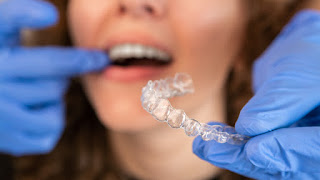every thing about Mouthwash
Mouthwashes contain various substances such as detergents, organic acids, sodium fluoride, and alcohol.
Mouthwash is a
liquid that is used to wash and keep the space inside the mouth clean. They
also contain antiseptics that kill the bacteria that live in the mouth. Some
people use mouthwash to get rid of bad
breath. And others use it to prevent tooth decay or prevent the
accumulation of plaque and sticky substances that contain bacteria and germs which
can lead to oral diseases.
Is mouthwash
a substitute for brushing?
No, mouthwash
does not replace brushing or flossing. The only effective way to remove plaque
and bacteria from the surface of the teeth and under the gums is by brushing
and flossing correctly. Fluoride mouthwash does not help strengthen tooth
enamel and fight gum disease unless you use it after brushing and flossing.
Teeth should be thoroughly cleaned when exposed to this substance.
Benefits of
mouthwash:
Mouthwash can
reduce bad mouth odor. Fluoride mouthwash can prevent tooth decay, protect
tooth enamel, and fight plaque.
It reduces the possibility of gingivitis and
its non-alcohol type can prevent dry mouth.
Complications
Don’t overuse
mouthwashes.
Chlorhexidine
mouthwash:
Due to the
concentration of chlorhexidine in mouthwash solutions, it can temporarily
affect the sense of taste. Another side effect of chlorhexidine is browning of
teeth. Of course, this color effect is on external surfaces and can be
stabilized. Chlorhexidine prevents the production of acid by oral bacteria and
thus keeps the oral environment alkaline, which may lead to the formation of
supragingival plaque.
Fluoride
mouthwash:
Fluoride is
very useful for strengthening tooth enamel and preventing caries. At the same
time, it is considered a toxic substance, and the percentage of its use in
health products is very important. But some people are allergic to this
substance.
Loss of
beneficial bacteria:
Mouthwash has
antiseptic and antibacterial properties. So, in addition to harmful bacteria,
it also destroys beneficial bacteria (defense barrier to fight pathogens). The
wrong and frequent use of mouthwash will lead to a weak immune system.
Long-term use
of oxygenated mouthwashes causes soft tissue irritation, loss of calcium on the
tooth surface, and black spots on the tongue.
Summary:
Currently, the
number of people who use mouthwashes as antimicrobial agents and reduce bad
breath has increased. Using mouthwashes without a dentist's opinion can cause
complications. It is better to get help from a dentist before using it.

Comments
Post a Comment